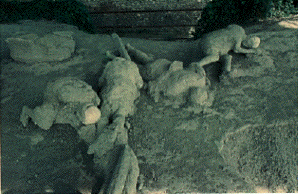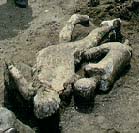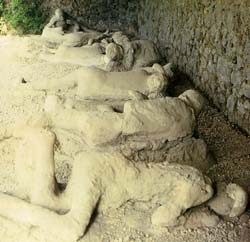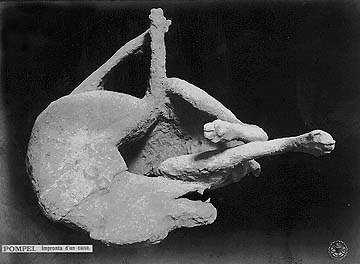 |
 |
People of Pompeii
| When Mt. Vesuvius erupted, Pompeii was covered with more than 15 feet of volcanic debris. The next day, hot ash and gasses surging along the ground at more than 60 mph suffocated and buried those who remained. |
 |
 |
Some victims had been trapped in their homes and killed by hot ashes, while others tried to flee but were killed by poisonous gasesEither way, it was a tragic death. During the eruption, ash mixed with rain and settled around the victims, preserving a mold of the body. |
| Eventually the bodies decayed, leaving detailed cavities and impressions in the compact ash. In the mid 1800's, Giuseppe Fiorelli developed the technique of filling the cavities with plaster of paris to create the forms of the figures in their dying moments. When the plaster dried, the ash was chipped away and the casts remained. Casts of many hundreds of the victims have been created in this manner. | |
 |
In 1966, the impressions of thirteen adults and children were discovered huddled together in this Garden of the Fugitives, a startling image of death. |
| Much of Pompeii has been excavated and it has revealed much about how people lived during that time (and died during the eruption). The mold of a dog is shown and this poor animal was chained to a post and struggled for hours before finally succumbing to the ash. |
 |
 |
In Pompeii, art was used to communicate as well as decorate. The message of a home owning a dog is also an example of a mosaic, which are pictures made of tiles, and each small tile helps create the large picture. The message on the mosaic, incidentally, is "CAVE CANEM (Beware of the Dog)." |
|
RETURN TO THE HISTORY HOUSE POMPEII SECTION |
 RETURN TO THE HISTORY HOUSE ARCHAEOLOGY ROOM |
 RETURN TO THE HISTORY HOUSE HOME PAGE |
|
contact  The
History House. The
History House. |
|
|